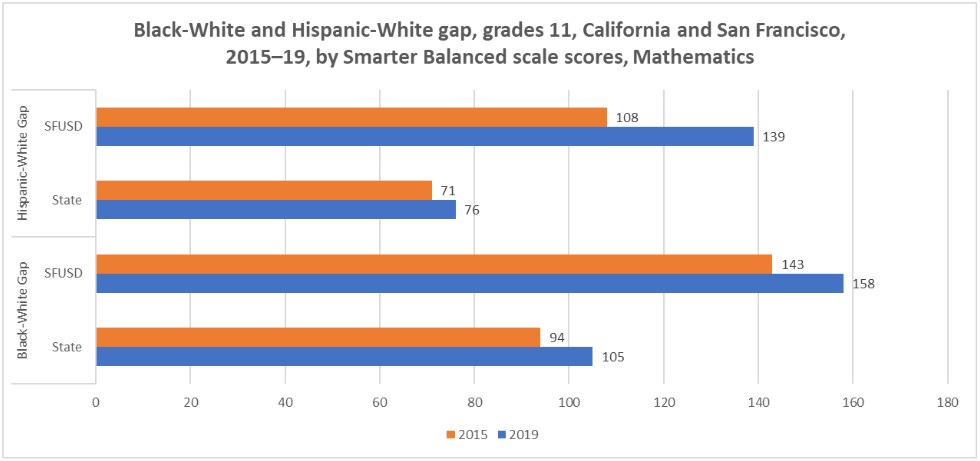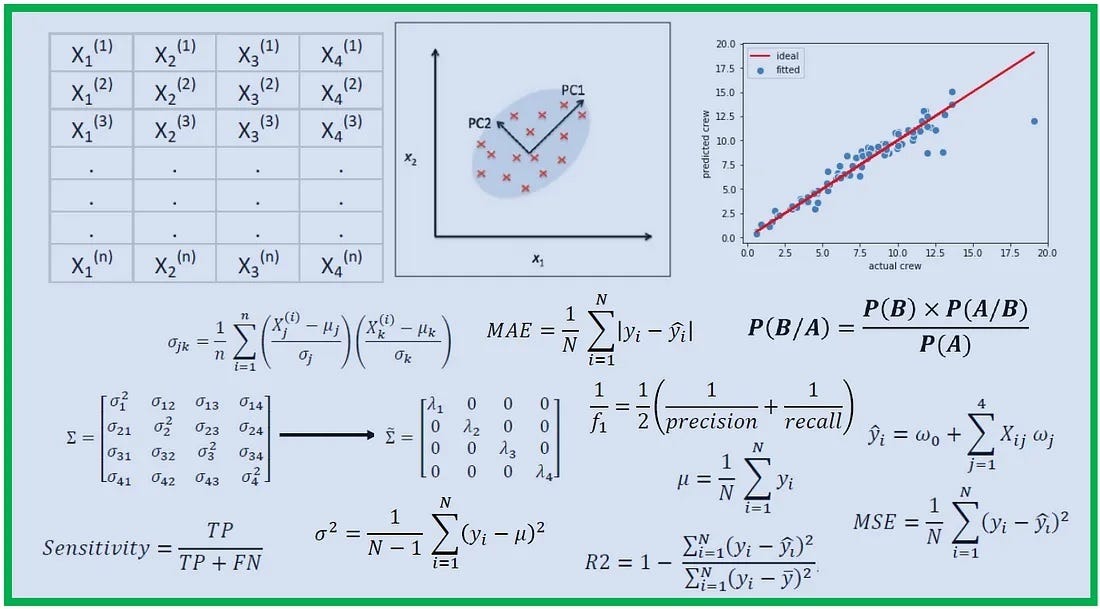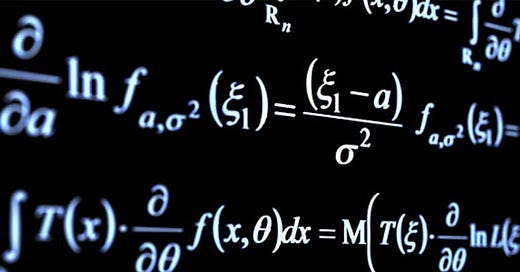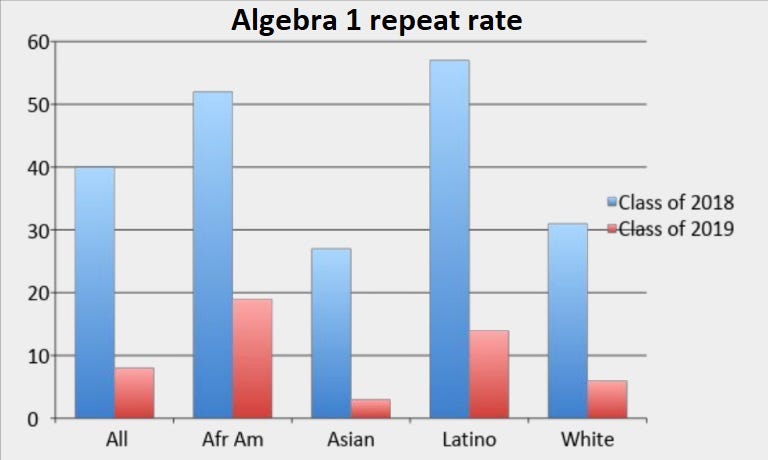In an old Saturday Night Live skit, Chevy Chase, portraying Gerald Ford, says “It was my understanding that there would be no math.” Half a century later, it seems like this has become America’s national motto. Even as high-tech manufacturing has migrated relentlessly to China, plenty of Americans seem to think that they — or anyone — should be able to flourish in a modern economy without a functional understanding of mathematics. U.S. high school math scores lag significantly behind other countries, even though scores in reading and science are above average, and our country is utterly dependent on a continuous inflow of foreign talent for a number of critical STEM fields. Math, out of all subjects, seems to hold a special terror for Americans, who often seem to view the subject as a test of innate intelligence rather than a skill that can be acquired and honed through hard work.
In response to lagging math scores, educators in California have been trying to water down math education — banning students from taking algebra in 8th grade, replacing advanced algebra classes with “data science” courses that don’t even teach the algebra required to understand basic statistics, and so on. I see this as an extremely wrongheaded move, and I’ve been meaning to write about it for a while. But data analyst Armand Domalewski, a friend of mine, has been following the issue far more closely than I have, and has been outspoken about it on social media, so I thought I would ask him to take a crack at saying what needs to be said.
One of the strangest things about California is that it is simultaneously one of the technology capitals of the world and has some of the worst math scores for children in the entire United States. In practice, California has relied on a combination of pockets of home grown math excellence and imported math whizzes from around the globe to bridge the gap between the math skills it needs and the math skills it has. It works, somewhat—but we can and should do better by all of the kids in our state.

We have a chance to do exactly that with the release of a new California Math Framework (C.M.F.), a document used by the state to establish math curricula for all public schools in California. Unfortunately, that process has been hijacked by a “math reform” movement led by Stanford Professor Dr. Jo Boaler, who claims to advocate for a more inclusive way of teaching that would replace memorizing times tables with real-world problem-solving. Her worldview has gained credence in influential educational circles because, to many people, including myself, the basic premise is extremely appealing: replacing rote memorization with creative problem solving, making math more inclusive to all kinds of students, embracing a growth mindset, etc. all sound lovely. And honestly, I don’t think at a high level that these concepts are wrong—what is broken, however, is the specific implementation of these ideas as advocated by Dr. Boaler and implemented by California education policymakers.
Math should be more inclusive. Math should be more engaging. I think one of the biggest mistakes both Dr. Boaler’s supporters and detractors have made in this debate is to try to slot what should be a practical, fact based argument about optimal math education into an ideological struggle invoking silly phrases like Woke Math. Dr. Boaler and her fans did not make math education worse by being too left wing in their math—whatever that even means—but by sloppy with their science and lazy with their facts. You don’t make math education better by advocating for changes based on lies, and unfortunately, that is exactly what happened here.
Two of the major policy changes proposed in the draft CMF are already showing indications of disaster. The first is moving Algebra education out of 8th Grade.
The Sordid Saga of 8th Grade Algebra in San Francisco
One of the ideas underpinning the California Math Framework is the notion that math needs to be “detracked”—instead of allowing some students to take Algebra I in 8th grade, it would require all students to enroll in the same math curriculum until the 9th grade. Advocates argue this promotes equity, while detractors argue that it diminishes excellence. Years ago, I supported San Francisco’s efforts to rework the curriculum based on that argument—I believed those who said it would improve educational outcomes for the kids struggling the most without hurting those who were already succeeding.
I was wrong. Not only did pushing out 8th grade Algebra hurt kids who were at the top of their class by forcing them to pay for private classes or other workarounds to get the credits they needed to apply for UCs, the claim that it would help outcomes for kids who were struggling turned out to be a bald faced lie.
In 2017, SFUSD claimed a "dramatic increase in student comprehension" and a drop in Algebra 1 repeaters from 40% to 7%, and credited detracking. An analysis by Families for San Francisco found that this claim was utter nonsense. Algebra 1 grades did not improve at all, and the only reason the repeat rate went down was because SFUSD straight up eliminated the requirement that you had take an exit exam in order to progress!
Not only that, but the group was unable to replicate the 40% to 7% drop using the data provided by SFUSD through a records request, and no other independent entity has been able to validate that number as well.
Page 6 of this report is particularly damning–SFUSD provides numbers that, when reverse engineered with some basic Algebra, would imply a class size of 2475 students when the actual class size was 4011. What happened to the other 1,536 students? The shoddiness of this evidence did not stop Dr. Boaler from touting this as a major success for her ideas, and until very recently, did not stop the CMF from citing it as a major argument in favor of detracking.

Not only did detracking not achieve its stated goals of advancing math equity in San Francisco, it actually harmed Black and brown students. By the end of 10th grade, Algebra 2 enrollments of Black and brown students declined, since their families were less likely to afford the expensive work arounds that white and Asian families pursued. Instead, most of the district’s Black and Latino students ended up in a diluted “compression” course that lacked about 75% of the state’s precalculus “+” standards, where the “+” standards are defined as “additional mathematics to prepare students for advanced courses,” making it difficult for students to pursue more advanced math in college. (Which is why, counter the claims of some detracking advocates, the UCs do not officially credit this compression course as “advanced math.”)
The result? They’re grim. If you compare statewide results against SFUSD results on California’s Smarter Balanced tests, which assess student performance across the state, you see that between 2015 and 2019, at the state level, the eleventh-grade Black-White student gap grew by 11 points—from 94 to 105—while in SFUSD, the gap expanded by 15 points (from 143 to 158). The outcomes are even worse for Hispanic students. The Hispanic-White gap at the state level gap grew by only 5 points, but in SF, it grew by 31 points.

As with all education data, there are always a million variables and you can never conclusively say that a single policy change caused a specific outcome, but at the very least, it is hard to argue that these 8th Grade Algebra changes advocated by Boaler helped SFUSD, and even harder to argue they serve as a model for our state.
Unfortunately, that is not the only controversial policy change being pitched in the CMF: another poorly conceived notion is the replacement of the second year of Algebra with “data science.”
Replacing Algebra II with “Data Science”
For decades, American math curriculum has followed a standard sequence: arithmetic, algebra, geometry, algebra II, precalculus and trigonometry, and calculus. The University of California required you to take three years of high-school math, culminating in Algebra II. In October 2020, the UC Board of Admissions and Relations with Schools (BOARS) recommended allowing alternatives to the second year of algebra—including data science. Courses like “Introduction to Data Science,” developed by UCLA and “Explorations in Data Science,” developed by Dr. Boaler, started popping up. The argument was that these classes would teach data skills relevant to the 21st century, such as collecting and analyzing data on “real-world topics,” in contrast to Algebra II, which Boaler said was as relevant as “sock darning and shorthand.”
And look, in theory, this sounds nice. I mean, my job is literally data analyst—I analyze, evaluate, and interpret data for a living! When I first heard about this, I was thrilled. But when I thought about it a bit more, it gave me pause—the skills I use daily as a data analyst are based on a foundation of Algebra and Calculus. It didn’t quite make sense to me how you could replace Algebra II with data science—the formulas that make up linear regression, for example, don’t make any sense unless you have at least a basic grasp of algebra. Logarithms and trigonometric functions are pretty core to doing data science work! So I started digging into what was actually being taught in these “data science” courses and was…frankly, I was horrified.
While UC Admissions requirements state that Algebra II alternatives still have to “build on” certain core concepts in Algebra II, in practice this does not seem to be enforced. The “Introduction to Data Science” produced by UCLA contains very little Algebra II and “Explorations in Data Science” only claims to teach the portions of Algebra II that overlap with statistics, leaving huge swathes of math necessary for an eventual career in STEM completely untouched.

Frankly, reading the CMF does not give me the impression that its authors have a strong understanding of what data science is, exactly. It includes phrases like “the numbers are staggering: around 1.7 megabytes of digital data were created and stored every second for every person on Earth in 2020, and the vast majority of data goes unanalyzed.’ As Dr. Brian Conrad points out, this is a nonsense statement. Is 1.7MB a large amount? (No, literally one JPEG can be that size.) Most of that is likely video, how exactly should that “data” be “analyzed”? And how do the authors even know it’s not being analyzed? After all, every video uploaded to YouTube gets tossed into an algorithm that produces viewing metrics, there are data scientists analyzing those uploads for trends, etc? (The authors probably found it by googling “impressive big data stats'', which spat out that statistic as the first result at the time the CMF was drafted.).
I wish this ignorance of the subject matter was limited to cute illustrative examples, but unfortunately, it permeates the basic thinking and structure of the document. The core issue of the CMF’s “data science” section is that it claims to be discussing data science while it is actually discussing data literacy. Don’t get me wrong—data literacy is good! Society would be better off if more people understood how to clean data or read a poll accurately. But this is not data science and it is not math. The CMF is replete with statements like “high-school data-science class students can learn to clean data sets – removing any data that is incorrect, corrupted, incorrectly formatted, duplicated, or incorrect in some other way [...] High school students can also learn to download and upload data, and develop the more sophisticated “data moves” that are important to learn if students are tackling real data sets.'' This teaches you how to use Excel, sure—but it does not teach you how regressions work, how statistical tests work, the multivariable calculus and linear algebra you need to do the job of an actual data scientist!
In response to this, science and math professors across the state have been raising alarms. In response, Dr. Boaler turned to a tactic she often relies on—trying to wrap her ideas in the context of a broader culture war, painting critics as stodgy conservatives fighting her efforts to make math more equitable and diverse. She described her critics as those resisting change. The notion that teaching this version of data science rather than Algebra II is somehow more equitable permeates the CMF in often bizarre ways.
The CMF says data science is more equitable than other STEM fields because “data scientists work together to address uncertainty in data while avoiding bias.”
Err, what? I’ve met many data scientists who do not work together or address uncertainty in data while avoiding bias, and many non-data science STEM professionals who do. There is absolutely nothing inherent to data science that makes it more collaborative or unbiased than other STEM fields…
It goes on to say…“Traditional mathematics lessons that have taught the subject as a set of procedures to follow have resulted in widespread disengagement as students see no relevance for their lives. This is particularly harmful for students of color and for girls…The data science field provides opportunities for equitable practice, with multiple opportunities for students to pursue answers to wonderings and to accept the reality that all students can excel in data science fields.''
I agree that traditional math as currently taught does disengage a lot of students, and in particular women. But there is absolutely no evidence offered in the CMF to suggest that data science education would somehow be different, and there is something profoundly weird about the suggestion that students of color and girls can excel in data science fields but not excel in other fields of mathematics. The primary reason girls, for example, diverge from boys in math performance is because society teaches them that math is not for girls. That is not something swapping out actual math for a watered down “data science” course can solve, and it’s pretty gross for people to claiming to be trying to make math more equitable for women and people of color to be pushing a program that will actually make them worse at math. Dr. Boaler and the CMF are basically saying “women and people of color aren’t doing as well in math, so we should just give up on teaching them actual math. It’s bananas!
But don’t take my white, male word for it—a group of Black UC faculty members in data science-related fields wrote a letter stating, “‘Introduction to Data Science’...make[s] claims that they specifically support learning for women and minorities, which are not only baseless, but fail to appreciate that they actually do the opposite and harm students from such groups by steering them away from being prepared for STEM majors.”
The CMF needs to reject these half-baked ideas
There’s a reason why these folks have been joined by other Black mathematicians around the country, such as Dr. Jelani Nelson, in pushing back fiercely against the ideas around 8th Grade Algebra and data science proposed in the CMF. (And a reason, perhaps, that Dr. Boaler threatened to call the police on him for it!) There’s a reason why Stanford Mathematics professor Dr. Brian Conrad wrote, in a comprehensive takedown of the CMF you really should read, that “whatever author is responsible for such a myopic view of mathematics should never again be involved in the setting of public policy guidance on math education.” There’s a reason why the authors of papers Dr. Boaler cites to back up her work consistently say she has misread and misrepresented their work, and that it does not support the claims she is making. And the reason, simply, is that her ideas have not worked. Forcing all children to defer Algebra until 9th grade,trying to squeeze two years of schooling into one year of a watered down “compression course” rejected by the University of California for not meeting its standards, and replacing Algebra II with a glorified data literacy course masquerading as a “data science” course does not help high achieving kids or struggling kids or any kids in between—it hurts them all.
California students need different answers on math–what we’ve been doing for the past few decades hasn’t worked. But that doesn’t mean we should embrace the ideas embodied in the current CMF draft, which were built on decades of shoddy and dishonest academic research, and throw up our hands at the notion of teaching underperforming kids advanced math entirely. The good news is that there are answers out there—we can learn from other countries teach math differently than we do, we can integrate findings from the “science of math”, and more. Our kids deserve a better California Math Framework than the one we’re being offered now—let’s get it done.







"One of the ideas underpinning the California Math Framework is the notion that math needs to be “detracked”—instead of allowing some students to take Algebra I in 8th grade, it would require all students to enroll in the same math curriculum until the 9th grade."
This is the single most utterly moronic proposal I have ever seen in all the annals of education reform.
I went to a small, fairly traditional K-8 private school. No fancy technology or trend-chasing pedagogy, but relentlessly back-to-basics, serious education. Our entire reading education was phonics for instance, and this was in the early-mid 2000s when I am under the impression that the war on phonics had made significant gains. Each grade had two math tracks, with the upper track one year ahead of the lower track. From Kindergarten on, I and a couple other kids were tracked *two* levels ahead, meaning I took the math classes of the upper track in the grade above. What this meant was that I took Algebra 1 in 7th grade. In 8th grade I arrived at school 40 minutes early to take Geometry one-on-one with one of the 8th grade math teachers (the other few 2-track-up kids had dropped down to regular upper-track by then).
This was an immense benefit to me, and meant I was able to take Calc BC in 11th grade, allowing room for one more STEM elective in 12th grade. The idea of having to stick 2 grade levels below what I did is just horrifying. Not only in terms of boredom and lack of challenge, but also the impact on the other kids. I was already hyperactive enough in the classroom as is. Me in 8th grade in a pre-algebra class would have been a total shitshow.
I know this is a bit long-winded and ranty, but there are few things that make me seethe with incandescent rage as much as this new trend of forcing everyone to operate at the very lowest level for the sake of "equity". Let's be real about what "equity" is: kneecapping the best and brightest so that the worst and least competent can feel better about themselves and useless bureaucrats can pat themselves on the back. It's this absolutely poisonous idea that because some people are incapable of achieving something, nobody at all should allowed to achieve it for themselves. Literal kindergarten playground mentality. Frankly, even in the counterfactual world where detracking *did* reduce racial gaps, I wouldn't care.
Keep the law of Jante over in Scandinavia please. I don't want it here.
And ed school PhD programs frankly seem more like a massive grift the more I read about them. Is there any evidence to the contrary? If so, I'd love to see it. My impression is basically they're a giant factory of breaking things that ain't broke. The war on phonics being the most obvious example.
I’m a California high school physics teacher and this just freaks me out. My district recently moved physics from 3rd to 2nd year and I already have a majority of students incapable of handling the simplified math we are allowed to include according to the Next Gen Science Standards. Math skills took the biggest hit in the pandemic, and I’ve been holding my breath for a return to normalcy that I do not see happening. I agree that this new framework is mostly just giving up on math.